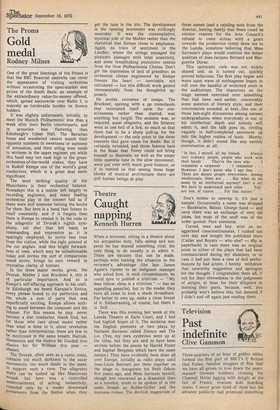Theatre
Caught napping
Kenneth Hurren
When a reviewer, sitting in a theatre about his scrupulous duty, falls asleep and suspects he has missed something vital, the only thing to do usually is to admit it. There are excuses that can be made, perhaps even turning the situation to the reviewer's advantage (the late James Agate's riposte to an indignant manager who asked how, in such circumstances, he could dare to publish a criticism — "My dear fellow, sleep is a criticism " — has an appealing panache), but to the reader they have all come to look a shade threadbare. Far better to own up, make a clean breast of it. Embarrassing, of course, but there it is. Still . . .
There was this evening last week at the Lamda Theatre at Earls Court, and I had had, highish hopes of it. The occasion was the English premiere of two plays by Nathalie Sarraute called Silence and The Lie. (Yes, my own eyebrows went up at the titles, but they are said to have been written before the pieces by Harold Pinter and Ingmar Bergman which have the same names.) They have evidently been done all over Europe, initially as radio plays until Jean-Louis Barrault put them together on the stage to inaugurate his Petit Odeon five years ago, and Mme Sarraute herself, though less renowned as a dramatist than as a novelist, tends to be spoken of in the same breath as Robbe-Grillet and the nouveau roman. The devilish magnetism of
these names (and a cajoling note from the director, hinting darkly that there could be sinister reasons for the Arts Council's refusal to come across with a grant towards the production costs) drew me to the Lamda, somehow believing that Mme Sarraute's plays would combine the better qualities of Jean-Jacques Bernard and Marguerite Duras.
This optimistic view was not widely shared and, as it turned out, quickly proved fallacious. The first play began and wave upon wave of nothingness began to roll over the handful of wretched souls in the auditorium. The characters on the stage seemed exercised over something that had been said earlier, conceivably some question of literary style, and their conversation sounded, at best,,,like one of those late-night discussions among earnest undergraduates when everybody is out of his intellectual depth and nobody will admit it, and the talk goes on, circling vaguely in half-completed sentences up into the higher realms of bosh. Mostly, though, it didn't sound like any earthly conversation at all:
"In fact, I myself, all my friends . . . Always very ordinary people, people who work with their hands . . . They're the ones who . . . I remember a carpenter . . . I remember . . However, I don't know why I say that . . . There are decent people everywhere. Among intellectuals, there are . . . But what do we mean by an intellectual anyway? Isn't it so? We have to understand each other . . . You are one, of course . . . For that matter."
Don't bother to unwrap it, it's just a sample. Occasionally a name was dropped — Baudelaire, Balzac, George Sand — and. once there was an exchange of very old jokes, but most of the stuff was of the order quoted. Pure nembutal.
Cursed, man and boy, with an exaggerated conscientiousness, I rushed out next day and bought the published texts (Calder and Boyars — who else? — 40p in paperback) in case there was an original point to either of the plays that had been communicated during my slumbers, or in case it had just been a case of dull performances by bad actors. I hereby withdraw that unworthy suggestion and apologise for the thought. I congratulate them all, if not for their shrewdness in the judgement of scripts, at least for their diligence in learning their parts, because, well, you probably won't believe this, but damned if I didn't nod off again just reading them.


































 Previous page
Previous page